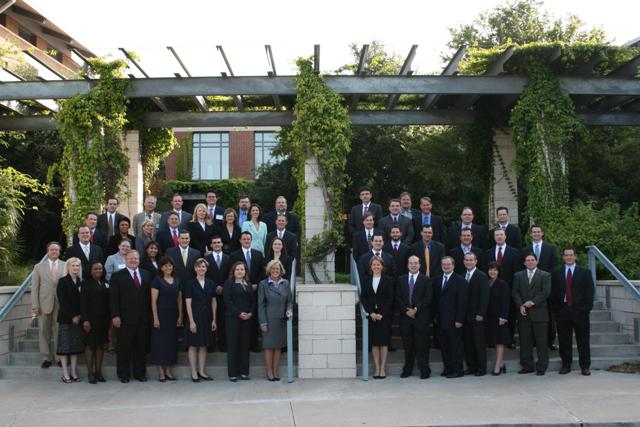State Prosecutors Gather at Baylor Law School for Trial Advocacy Course

TDCAA Trial Advocacy
by Julie Carlson, director of communications, Baylor Law School, (254) 710-6681
It might be between academic quarters, but Baylor Law School's Sheila and Walter Umphrey Law Center is a busy place this week. District and county attorneys from throughout Texas are attending courses at the Law School in advanced trial advocacy skills for felony prosecutors. Sponsored by the Austin-based Texas District & County Attorneys Association (TDCAA), the week-long, invitation-only Advanced Advocacy Course brings together experienced prosecutors and helps them refine their courtroom skills.
During the week, the 40 participants attend lectures on a variety of topics, including issues of indictment, jury selection, confessions, opening statement strategies, direct and cross examinations and closing arguments, among others. Participants then break into groups of nine or 10 for practice in one of the Law School's four courtrooms. During this time, students are videotaped and critiqued on their skills. Highly experienced prosecutors and judges serve as faculty during the week, while local police officers and staff from the McLennan County district attorney's office act the part of witnesses. County residents serve as the jury.
This year's seminar has focused on murder cases. Previous courses have focused on sexual assault cases and narcotics cases.
"We are using a real case that was brought to us by Shane Phelps, who is First Assistant District Attorney for Brazos County," said Clay Abbott, DWI Resource Attorney for the TDCAA. "The students are expected to prepare for the case before the course begins and we give them 'homework' at night. They need to prepare like they would before a trial, because they are expected to perform."
This is the fourth year the Law School has hosted the TDCAA course. With its courtrooms and state-of-the-art technology, the school has provided a perfect venue for the course.
"We really couldn't do this type of training at any other location," said Judy Bellsnyder, meeting planner for the TDCAA. "The purpose of this seminar is to help our participants hone their courtroom skills, but it is difficult to 'mock up' a hotel meeting room to look like a courtroom. Plus, the video technology is all in place so we don't have to bring in cameras and tripods. And I can't say enough about Baylor Law School's hospitality."
TDCAA officials are so impressed with the school that they are trying to arrange a similar course for beginning prosecutors. Additionally, this week the organization will hold Victim Assistance Coordinator Training and Appellate Advocacy Training courses at the Law School. The TDCAA also will host a legislative update session Friday afternoon. The session is designed to acquaint regional law enforcement officers, judges, attorneys and others with information from the recent Texas legislative session.
Speakers at this year's course were Doug Arnold, assistant district attorney for Williamson County; John Bradley, district attorney for Williamson County; Dib Waldrip, district court judge of Comal County; Justice Cathleen C. Cochran of the Court of Criminal Appeals; Lance Long, assistant district attorney for Harris County; Bill Turner, district attorney for Brazos County; Kelly Siegler, assistant district attorney for Harris County; Scott Simpson, assistant district attorney for Bexar County; and Phelps.
Faculty advisors, who work with participants on their courtroom skills, were Jack Choate, assistant criminal district attorney for Walker County; Rick Daniel, assistant criminal district attorney for Denton County; William Exley and Mia Magness, who are assistant district attorneys for Harris County; Jana McCown and Lindsey Roberts, both assistant district attorneys for Williamson County; Hillary Netardus, assistant criminal district attorney for Randall County; and Rainey Webb, assistant district attorney for Tarrant County.
In addition to Bellsnyder and Abbott, other TDCAA staff who helped with the advocacy course were Erik Nielsen, director of training; Diane Beckham, senior staff counsel; and Ashless Myers, meeting planner.